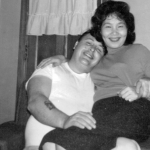Lauren Druml, a member of this year’s June cohort, wrote about her experience in the program and the impact participation will have on her medical career.
Profiles
A New Service Delivery Model: How IRETA has Adapted Clinical Quality Improvement in the Era of COVID
IRETA faced the challenge of switching completely to telehealth with very little notice. IRETA’s Director of Clinical Quality Improvement Services, David Reazin, MHS, answered questions about what it was like to adapt to telehealth and the pros and cons of virtual groups.
Let’s Say You Run a Mayoral Campaign Focused Solely on Addiction. You Win. Then What?
When Kelley Kelley took office as the mayor of Turtle Creek, she’d promised the community that she would do a better job addressing addiction and its harms.
Tobacco Killed My Dad Ten Years Too Soon
As a trainer for IRETA, when I talk about the consequences of substance use, I always include tobacco.
Interactive Journaling: A Structured & Client-Directed Therapeutic Writing Tool
Interactive Journaling is an evidence-based approach to helping clients move through the stages of change.
Creative Responses to Youth Substance Use
Young people are creative–we should be, too. Learn about the Hilton Foundation’s flexible approach to SBIRT for youth.
An Interview with Em DeMarco on Recovery Homes
A couple of months ago, I read an article called The Brotherhood of Recovering Addicts about recovery homes, also known as sober homes and three-quarter way houses
Out of Sight, Out of Mind?
SBIRT pushes healthcare integration, heightens awareness of behavioral health problems. We’ve got a chance to connect more substantially with the folks who are using SBIRT in northeast Ohio, including ONE Health Ohio CEO Ron Dwinnells.
A Look at Treatment History: The Narcotic Farm
The history of professional addiction treatment in the United States is fairly short and very complicated. Opened in 1935, the pastoral prison, rehab, and research center had a major impact on evidence-based practices today.
Bill White Interviews IRETA Founder
Michael Flaherty was and continues to be a driving force behind the paradigm shift in addiction treatment from an acute to a chronic care model. He started The Institute for Research, Education and Training in Addictions (IRETA) in 1999.














